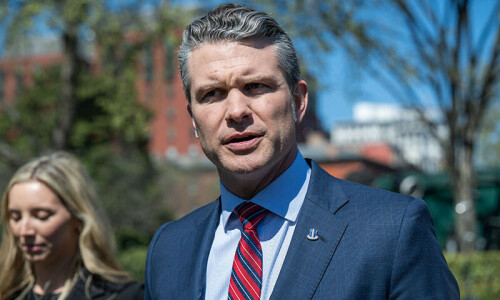The public’s demand for good governance is high in Pakistan, but its supply unfortunately low. Global experience reveals that strong institutions produce good governance. Ironically, in the recent struggle launched for good governance against PML-N by PTI and PAT, all three parties have seriously undermined the legitimacy of state institutions.
PML-N delegitimised institutions by using the state machinery for its political purposes and its controversial hiring, firing and non-hiring actions. This has included appointing ex-caretakers to plum positions and firing heads of Nadra controversially.
PTI furthered this delegitimisation by hurling unsubstantiated accusations at election tribunals, ECP, Nadra and courts.
While admitting under intense media questioning that it only possesses circumstantial evidence against these institutions, PTI fails to admit that circumstantial evidence at best justifies raising mild suspicions, not full-throated certitudes about institutional involvement in rigging.
Political parties have undermined state institutions’ legitimacy
PAT has taken this delegitimisation to a higher plane by calling for a whole-scale replacement of the current system through a revolution. Ironically, the only institution spared by its planned revolution is the institution (the old-order military) whose disintegration has been the prerequisite of all mega-revolutions (eg, Russian, Iranian, etc).
Understandably, Qadri is in no mood to challenge that vintage Pakistani behemoth. PAT also fails to mention that no revolution has ever delivered immediate good governance, the time gap at the very minimum being several decades, and most revolutions actually made things worse immediately.
Unfortunately, this assault by all parties on state institutions has been taking place precisely when they were starting to show at least rudimentary-level spine and capacity.
Tribunals are slowly but steadily disposing of cases at a faster pace than in earlier elections and without evidence of bias. Nadra has continued to produce objective verification reports that have attracted little criticism even after Tariq Malik’s unfortunate dismissal, despite possible PML-N attempts to undermine, and vociferous PTI charges questioning, its independence.
My interactions with state institutions at the federal, provincial and local levels (down to union councils across 30-plus districts) throughout Pakistan show that many institutions are gradually acquiring some delivery capacity after decades of incompetence.
Historians identify the 1960s as the golden era of Pakistani institutions when they worked efficiently, meritoriously and free from political considerations. However, despite their supposedly apolitical and meritorious functioning, their outputs then largely benefited elites in certain ethnicities.
Winning by campaigning against this elitism, Zulfiqar Ali Bhutto exposed state institutions crudely to meeting the full force of the political demands of hitherto marginalised groups and classes, in the process severely undermining institutional capacity.
Good governance emerges from strong institutions. Strong institutions emerge from relatively egalitarian societal structures which in turn usually emerge as per capita income, literacy, urbanisation and industrialisation levels increase.
As these levels are increasing gradually in Pakistan over the decades, its society is becoming less inegalitarian and the quality of institutions and hence governance is improving too. With time, one foresees these institutions reaching a stage under democracy where they exhibit neither Ayub-era elitism nor Bhutto-era politicisation but can blend merit-based and political considerations effectively to deliver efficient but egalitarian services.
Unfortunately, this pace is too slow for many, who instead favour deceptive short cuts to good governance like dictatorship, khilafat, revolution, technocracy etc. The latest quick-fix panacea to enthral Pakistani imagination is electoral reforms. It is naively believed that reforms will immediately produce a new breed of super politicians, who will immediately deliver high-quality governance, ie, democracy itself will produce short cuts to good governance thus creating a win-win situation.
However tempting it may be to let this misconception prevail as a way of marketing democracy, it must be punctured for realism’s sake. Sweeping electoral reforms must be initiated immediately since they will produce controversy-free elections and eliminate current-type political crises in future. However, they will not produce sudden and enormous improvements in governance. Such improvements will come incrementally over time as societal structures change and institutions strengthen slowly.
Thus, it is important for politicians to spare institutions from their political fights. It is also important for the public to be patient with Pakistani institutions and develop a longer-term vision.
The writer is a development and political economist and a Senior Fellow with UC Berkeley.
Published in Dawn, August 19th, 2014













































